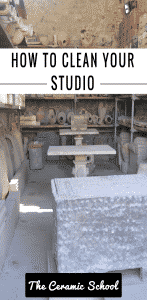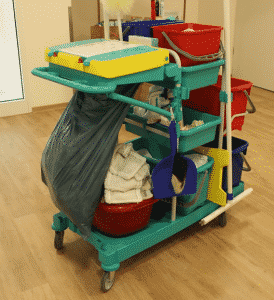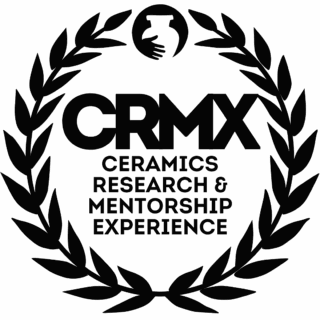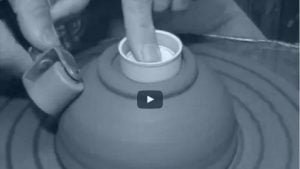 Cleaning your studio regularly is essential to having a safe environment to work. If you do not clean a pottery studio regularly then the dust from the clay can build up and cause long-term issues with your health. In this article, we are going to discuss how to clean your studio, steps to clean your studio, and things you should avoid doing in the studio.
Cleaning your studio regularly is essential to having a safe environment to work. If you do not clean a pottery studio regularly then the dust from the clay can build up and cause long-term issues with your health. In this article, we are going to discuss how to clean your studio, steps to clean your studio, and things you should avoid doing in the studio.
When cleaning your studio, it is important to clean daily if possible.
This will ensure that there is minimum dust buildup occurring in your studio over a long period of time. If you ignore cleaning your studio regularly then there will be a lot of dust and if you do this over a period of years then you could be at risk for a fatal lung ailment called silicosis. The best way to avoid this is practicing proper health and safety procedures in the studio and cleaning regularly.
The best way to clean your studio is by using clean water. Water will keep the dust from rising so it will not become airborne and get inhaled. Mopping the floor daily near your work areas such as your wheel and work table will remove clay dust and prevent buildup or dust as easily. If you have a floor drain you can even hose down the floor to clean it and then mop towards the floor drain. Not all locations have this though so just mopping normally and changing the mop water to prevent clay haze on the floor will work just as well.
When you are cleaning down your potter wheel or work table then it is important to use a wet sponge or even two to properly clean the area. When using two or more sponges it is easier to remove the clay haze from your areas and clean quicker. Place all trimmings in a bucket of reclaim which is made up of water and clay. This will allow you to reuse the clay that has been trimmed off of your work and if you do it right after you are done with trimming it is way safer than moving bone dry trimmings. Bone dry trimmings can stir up dust as they are moved and broken apart. If you have clay that is too hard to properly work with then you can place it in the reclaim bucket and it will be broken back down to slurry over time.
A good rule to have in the pottery studio is if you see dust then wipe it up with a sponge. This will prevent the dust from getting stirred around and spreading in the room. If you do not clean regularly the dust can get spread to other areas in the studio or house by the ventilation. Cleaning your clothes regularly is important to removing the built-up dust that gets stored in your clothes. If you have a canvas table it is a good idea to wipe it down slightly with a sponge before working on it in order to prevent dust from getting stirred up as you work over the table.

Another important thing to remember is that no matter what clay will produce dust. It is just a natural part of working with clay and we need to take precautions when working in this medium. When you are mixing up clay from a dry mix it will create a lot of dust. If you do not have a good ventilation system inside that will take the dust outside then it is important to mix clay outside. Always wear a proper dust mask. You will need one that is rated for fine particles or else it will just be useless against the silica. Look for a mask that has the NIOSH
rating to ensure it will filter out fine particles. When sanding greenware or bisqueware you should be wearing that same mask, and working either outside or in a well-ventilated area to prevent any clay dust from getting in the air. The same goes for mixing glazes as well in order to prevent dust getting stirred up when mixing.
Steps to Clean the Studio
If you were to create a checklist of steps for cleaning your pottery studio it might be similar to the list below.
Every studio is different, however, and these steps should be tailored to suit your work and your studio as best as possible. If your studio smells dusty it might mean that you aren’t cleaning it enough. If you turn on a fan and it is blowing dust all over the studio it means you might need to use the fan in a less dusty area or clean your area better. Some potters do not create very big messes and require less cleaning while others are quite messy. It is just how different people work, but we all must do our best to keep our studios clean for our health. We hope these steps below help you to make an easy checklist for cleaning your studio.
- Clean the debris off of your table
- Either throw it away or reclaim it
- Wipe down your tape with a wet sponge
- Clean your tools with a wet sponge and your tool bin
- If you glazed then wash the glaze from your brushes and dry them
- If you used a banding wheel then wipe down the banding wheel and put it away
- Wipe down and dry your tools and tool bin
- Clean debris from the floor by hand if it is trimmings and either throw out or reclaim
- Mop the debris from the floor if it is dust or clay slop
- Mop around all other areas such as work tables and wheels
- Rinse, dry, and put away mops
- Clean debris from sink by hand, with sponges, or other tools such as scrapers
- Throw away debris or reclaim it depending on if it is just one clay or a mixture of things
- Wipe down sink and areas around sink that might come in contact with water or clay
- Clean all sponges and towels and place them in a spot where they can dry well
Things to Not Do in The Studio
Dusting, sweeping and vacuuming should not be done in the studio or around clay. These methods raise dust particles into the air since there is no water to hold down the particles. It is especially important to not work in areas that have carpet because the carpet will store the dust similar to how clothes do. If you want to use a rug to try and prevent the tracking of clay to other areas then an outdoor carpet should be used and hosed off regularly. Other types of rugs can be impossible to clean the proper way unless they are professionally laundered at a facility.
In conclusion, having a clean studio means you are taking care of your health. It is important to have fun, but to also act safe in the studio to ensure that we are not harming ourselves or others. We hope this article helps you figure out how to best clean your studio to ensure you have a long and happy life. Do you have any of your own tips for cleaning a studio? Let us know in the comments below!






Responses